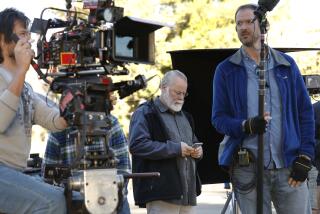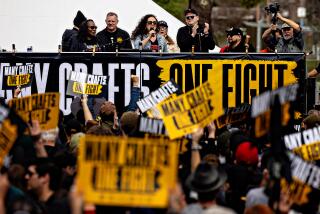Key role is also a tough one
- Share via
Neal Baer hasn’t written a word since the Writers Guild of America went on strike against the major studios three weeks ago. But the executive producer of NBC’s “Law & Order: Special Victims Unit” took a red-eye flight from Los Angeles to New York last week to meet with about 150 people on the show who could be out of jobs once scripts run out next month.
“I felt I owed it to my crew,” Baer said. “I wanted to tell them how deeply sorry I was. They face the calamity of being laid off. But the writers had to fight for what was right.”
Since the strike began Nov. 5, the elite group of TV show runners -- writers, including Baer, who also manage prime-time productions -- have felt torn by their dual loyalties to the guild and to their programs.
The majority agreed to stop work completely, hoping that by shutting down production of popular shows, studios would become crippled and would capitulate, thus bringing the strike to a quick end. Baer and other show runners vowed not to fulfill their producing obligations until serious negotiations resumed.
But a contingent of more than two dozen have quietly returned to work, editing episodes written before the strike began, according to talent agents and writers.
Their actions have stoked worries among writers about a repeat outcome of the last major Hollywood strike in 1988, when show runners went back to work after five months, undercutting the bargaining power of the guild, which ultimately agreed to terms that it had earlier rejected.
Whether the rift this time around will give the studios an advantage in negotiating a new contract will be unclear until the two sides resume talks Monday. Show runners have been credited with helping to bring the studios back to the table because some shuttered productions while others extended an olive branch by returning to work.
“I think we woke them up a little bit,” said Steve Levitan, the show runner for Fox’s “Back to You.” “What we’ve been saying all along is we’re your partners on these shows. We understand the big picture but we think that the studios have not been operating in good faith.”
What makes the situation complicated, said Baer, a member of the guild’s negotiating committee, is that “show runners are both labor and management.”
Show runners are responsible for the teams of people who bring TV to life.
“At the end of the strike, you have to ask yourself: ‘How did I behave?’ ” said veteran show runner Jonathan Prince, who returned to his job overseeing CBS’ “Cane,” starring Jimmy Smits.
“Although I was faithful to my guild by not writing one word, did I withhold my producing services? Or did I make sure that the production kept going so the crew could continue to earn a paycheck for a few more weeks?”
In the final weekend of October, just days before the writers contract expired, guild and studio negotiators remained far apart in reaching a new accord, disagreeing about the amount writers should be paid when their work is distributed over the Internet or other new media. No serious talks had even taken place.
The guild had held several meetings for show runners, but they were not well attended, according to Levitan, who previously had produced “Just Shoot Me.”
Levitan stepped into the breach. He invited a small group to lunch to discuss strategies for unifying Hollywood’s top writer-producers, giving birth to United Show Runners. The group designed the “Pencils Down Means Pencils Down” ads, signed by 150 show runners, that appeared in the entertainment trade papers Nov. 1.
That night, at a rally attended by 3,000 writers at the Los Angeles Convention Center, the guild announced plans to call a strike.
In an impassioned plea, one member of the Teamsters union told show runners they needed to honor the picket line if the guild wanted the support of his union. The Teamsters had the power to bring production to a halt because they deliver construction materials and other gear to sound stages and sets.
The next afternoon, an e-mail was sent by United Show Runners inviting writer-producers to a meeting the following day. On Nov. 3, about 100 show runners met at the Sheraton Universal Hotel, where Levitan moderated a session that lasted nearly three hours.
Some show runners who had hurried to finish scripts before the strike began were chastised for their reluctance to walk away from their productions.
“This is the only industry in the world where employees would actually do extra work to help their employer withstand a strike,” said Edward Bernero, the show runner of CBS’ “Criminal Minds.”
“Could you imagine being in a widget factory and having someone say, ‘Hurry up, let’s make more widgets because we are going on strike’?”
Bernero, a former Chicago police officer and son of a union truck driver, has not worked despite receiving a letter threatening legal action from CBS for breaching his contract.
At the gathering, Shawn Ryan, creator of “The Shield,” implored show runners to abandon all of their duties for at least five days as a sign of solidarity with the Teamsters. Ryan garnered respect not only because of his credentials -- he also produces CBS’ “The Unit” -- but for his passion and position on the guild’s negotiating committee.
A vote was nearly unanimous, with only 10 or 11 standing up against it, according to several people who attended.
“It was a very inspirational meeting,” Levitan said. “A lot of people came in with reservations and left with the idea that we can make a difference.” He said the show runners hoped to make the strike brief by shutting down their own productions.
The unity was tested three days into the strike. On Nov. 7, about 100 of the industry’s top writer-producers picketed Walt Disney Co., went to the Smoke House restaurant in Burbank for lunch and later adjourned to the guild offices in the Fairfax district to air their concerns.
By then, the Teamsters were crossing picket lines, the studios had sent breach-of-contract letters, and worse, a few show runners were producing on the sly -- at their homes and other locations, careful not to cross the picket lines.
Emotions were high. People yelled, booed and hissed. Writer-producers of new shows were freaked out by the threatening letters. Some expressed concern for their crews. Others doubted the walkout was having its desired effect as chief executives downplayed the strike’s financial toll. Several prominent show runners argued that editing was not part of the writing process or covered by guild rules.
Among those who advocated continuing the work stoppage were producers with little to lose. Their shows either were in pre-production, were comedies that had already gone dark because they involved last-minute writing during the taping or had non-writing producers on staff who could carry the load.
Others had more on the line. By refusing to work, Ryan missed out on the production of the final episode of “The Shield,” the FX drama that put him on the map.
“It’s scary because your life’s work is at stake,” said Kari Lizer, the show runner for “The New Adventures of Old Christine.” “Walking away and hoping that they’re not going to finish the shows without you, that’s the scary part. But I think the only way to make an impact is to stop providing our services.”
When it seemed the room couldn’t get any hotter, Andre Nemec, co-creator of “October Road,” emerged with a compromise: Show runners would tell studios they would resume producing as soon as “good faith negotiations” began.
In a vote, opponents were in the minority. But not everyone was feeling warm and fuzzy. Cellphones rang all over Hollywood the next morning. Show runners who wanted to produce felt pressured by hard-line colleagues who didn’t.
The first week of the strike ended with a rally at 20th Century Fox studios in Century City attended by about 4,000 people. An estimated 20 show runners convened afterward at Endeavor Talent Agency in Beverly Hills to hash out the situation. Worried that studios would seize upon division in the camp if they began to edit and produce, show runners concluded that anyone wanting to work should do so discreetly.
“Nobody wants to hurt the strike effort,” said a show runner who requested anonymity. “But this was a horrible idea. They opened up Pandora’s box by making it seem like we all agreed with this.”
Another flare-up occurred late last week after news reports that some top show runners were editing despite their promise to do so only under the radar.
Carlton Cuse, the executive producer of “Lost” and a member of the guild’s negotiating committee, was chided by fellow show runners after he was quoted in the Wall Street Journal defending his decision to put on his producer’s hat in the interest of fans. Cuse declined to comment.
If the strike lasts another couple of weeks, the issue of whether to produce or not will be moot. There will be no scripts left to shoot.
Howard Gordon, show runner for Fox’s “24,” says the question misses the point and distracts writers from their united stance on contract demands.
“Our leverage is that we are writers and that the pipeline will dry up,” said Gordon, who hasn’t worked since the strike began. “If the show is not as well-edited, it may reflect a little on the ratings, [but] it’s not going to be the factor that ends the strike.”
--
maria.elena.fernandez@latimes.com
meg.james@latimes.com
More to Read
The biggest entertainment stories
Get our big stories about Hollywood, film, television, music, arts, culture and more right in your inbox as soon as they publish.
You may occasionally receive promotional content from the Los Angeles Times.











